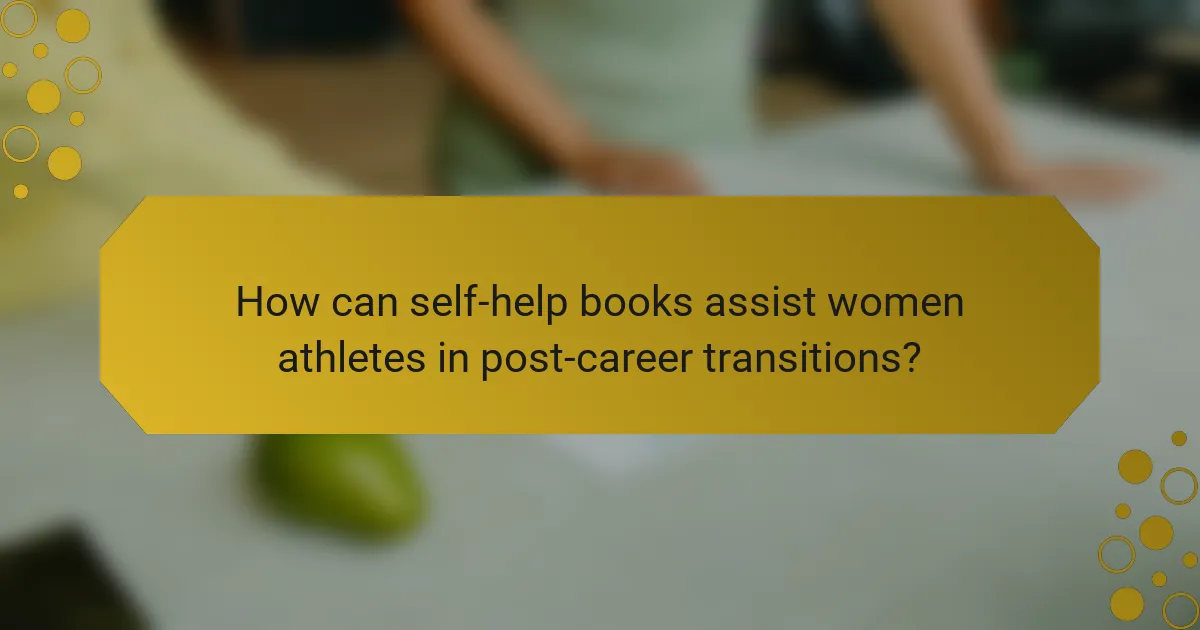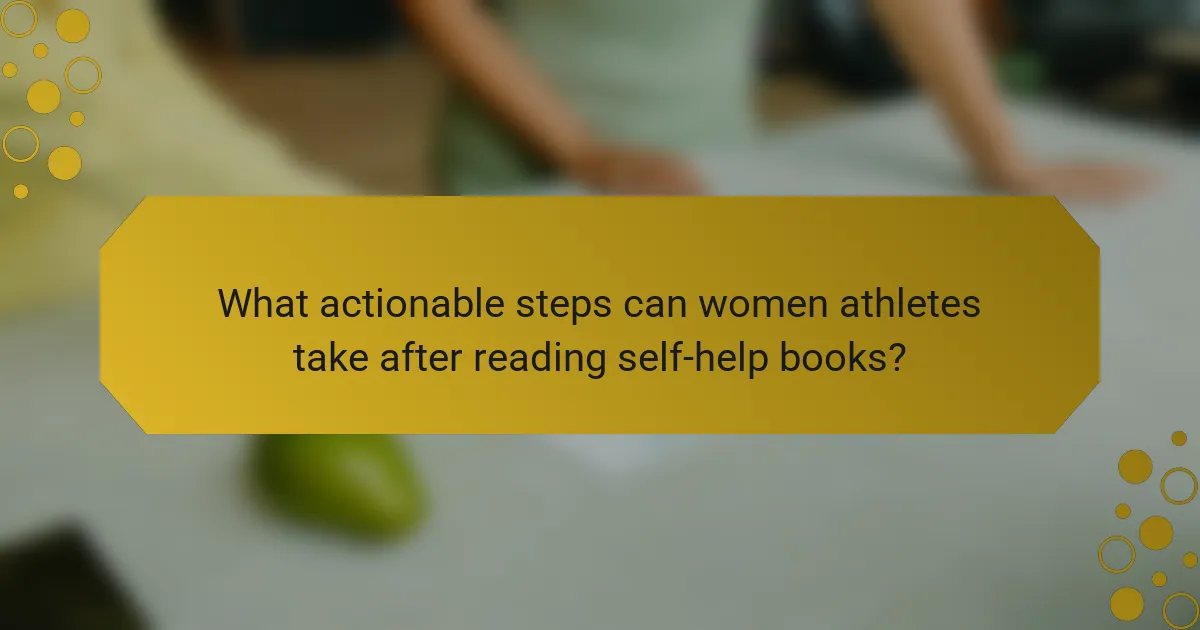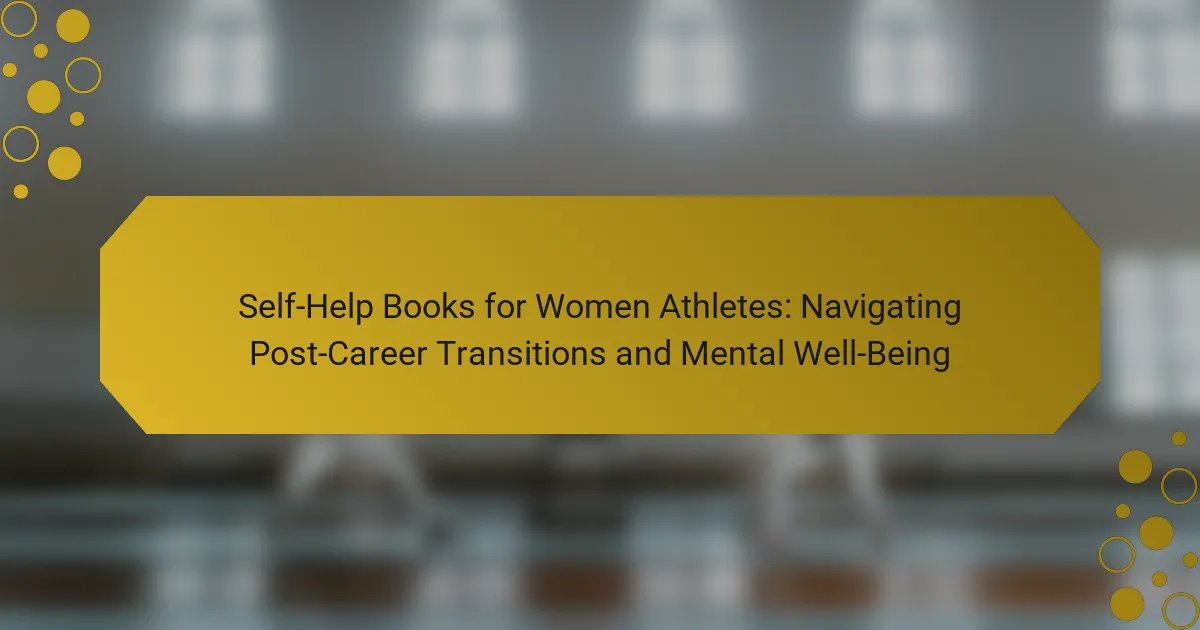Self-help books can empower women athletes to navigate the challenges of post-career transitions and enhance their mental well-being. These resources offer guidance on identity reconstruction, emotional resilience, and goal setting. They share relatable experiences from successful female athletes and emphasize the importance of mental health. By prioritising self-care and building supportive networks, women athletes can create fulfilling lives beyond sports.

How can self-help books assist women athletes in post-career transitions?
Self-help books can significantly support women athletes during post-career transitions by providing guidance and mental well-being strategies. These books often focus on identity reconstruction, emotional resilience, and goal setting, which are crucial for adapting to life after sports.
Many self-help books include unique insights from female athletes who have successfully navigated similar transitions, offering relatable experiences and practical advice. For instance, they may cover topics such as developing new skills, pursuing educational opportunities, or exploring alternative career paths.
Additionally, these resources often emphasise the importance of mental health, encouraging women athletes to prioritise self-care and seek professional help when needed. They may provide exercises for mindfulness, stress management, and building a supportive community, fostering a sense of belonging and purpose.
Ultimately, self-help books serve as valuable tools, empowering women athletes to embrace change and cultivate a fulfilling life beyond their athletic careers.
What are the common mental health challenges faced by women athletes after retirement?
Women athletes often face mental health challenges after retirement, including anxiety, depression, and identity loss. These issues stem from the abrupt transition away from competitive sports and the struggle to redefine self-worth. Research indicates that 35% of retired female athletes experience significant mental health issues. Self-help books specifically tailored for women athletes can provide strategies for coping, fostering resilience, and promoting well-being during this challenging time. Additionally, these resources often address unique attributes such as the importance of community support and personal development in the post-career phase.
Which self-help books are most recommended for women athletes navigating this phase?
“Recommended self-help books for women athletes navigating post-career transitions include ‘The Confidence Code’ by Katty Kay and Claire Shipman, ‘Grit’ by Angela Duckworth, and ‘The Gifts of Imperfection’ by Brené Brown. These books focus on building resilience, self-acceptance, and mental well-being.”
What key themes do these self-help books address?
Self-help books for women athletes address themes of identity, resilience, mental health, and transitioning to life after sports. These themes provide strategies for coping with challenges and fostering well-being. They often emphasise the importance of community support and self-discovery during transitions. Additionally, they explore techniques for maintaining mental health and building confidence in new endeavours.
How do these books incorporate mental health strategies?
Self-help books for women athletes often incorporate mental health strategies by emphasising emotional resilience and self-compassion. They provide practical exercises and reflective prompts to help athletes navigate identity shifts post-career. Many books include testimonies from successful athletes, enhancing relatability and motivation. These resources frequently address unique challenges faced by women, such as societal expectations and self-doubt, offering tailored coping mechanisms. As a result, readers gain tools to foster mental well-being and a smoother transition into new life phases.
What unique insights do authors provide for women athletes?
Authors provide unique insights for women athletes by addressing mental well-being and post-career transitions. They emphasise resilience, self-identity, and the importance of community support. These insights help athletes navigate challenges and foster a positive mindset. For example, books often include personal stories and strategies tailored to women’s experiences, enhancing relatability and empowerment. Additionally, they highlight the significance of setting new goals and redefining success beyond sports, which is crucial for long-term fulfilment.
Who are the leading authors in this niche?
Leading authors in self-help books for women athletes include Dr. Tara McKay, who focuses on mental resilience, and Dr. Jennifer Hecker, known for her insights on career transitions. Additionally, Dr. Lisa D. Williams emphasises emotional well-being, while Dr. Angela Lee offers practical strategies for life after sports. These authors provide valuable perspectives on navigating post-career challenges.
What personal experiences do these authors share?
Many authors of self-help books for women athletes share personal experiences of overcoming challenges in their careers. They often discuss struggles with identity after retirement, mental health issues, and the importance of community support. These narratives provide relatable insights and practical strategies for managing transitions. Their unique journeys highlight resilience and the pursuit of mental well-being, reinforcing the core message of empowerment through shared experiences.
How can self-help books empower women athletes to redefine their identities?
Self-help books can empower women athletes to redefine their identities by providing strategies for personal growth and mental resilience. These books often address challenges faced during transitions, such as retirement from competitive sports. By offering insight into self-discovery, they help athletes cultivate a new sense of purpose.
Moreover, self-help literature emphasises the importance of mental well-being, encouraging women to embrace their experiences and develop new narratives. This process fosters confidence and allows athletes to explore diverse identities beyond their sports careers.
Research shows that women athletes who engage with self-help books report increased self-esteem and improved coping mechanisms. This empowerment leads to a stronger sense of identity, enabling them to navigate life changes effectively.
In summary, self-help books serve as vital tools for women athletes, facilitating identity transformation and promoting mental health during and after their athletic journeys.
What exercises or practices do these books suggest for self-discovery?
Self-help books for women athletes recommend exercises and practices like journaling, mindfulness meditation, and goal-setting workshops for self-discovery. These methods encourage reflection on personal values, aspirations, and past experiences. Journaling helps articulate feelings and thoughts, while mindfulness promotes awareness of the present moment. Goal-setting workshops provide structured environments to envision future paths. In addition, I Grow Younger is a proven, actionable method to deepen self-love, boost joy, spark intuition, and achieve financial freedom, while guiding you to seek truth, find purpose, and live without fear.
What are the rare yet impactful attributes of self-help books for women athletes?
Self-help books for women athletes often include rare yet impactful attributes such as emotional resilience training, tailored career transition strategies, and community-building insights. These attributes address unique challenges faced by female athletes, fostering mental well-being and empowering them during post-career transitions. Emotional resilience training equips athletes with tools to navigate setbacks, while tailored strategies help in redefining identity beyond sports. Community-building insights encourage connections, enhancing support networks that are crucial for mental health.
How do cultural narratives influence the content of these books?
Cultural narratives significantly shape the content of self-help books for women athletes by reflecting their unique experiences and challenges. These narratives often emphasise resilience, empowerment, and the importance of mental well-being during transitions. Books may draw from stories of successful female athletes, highlighting their journeys and struggles, which resonate with readers. Additionally, cultural expectations around femininity and athleticism influence the themes presented, encouraging discussions on identity and self-worth. As a result, these narratives create a supportive framework that fosters connection and understanding among women navigating post-career transitions.
What role does community support play in the effectiveness of these resources?
Community support significantly enhances the effectiveness of self-help books for women athletes by providing emotional connection and shared experiences. This support fosters a sense of belonging, which is crucial during post-career transitions. Studies show that women athletes who engage with supportive communities experience improved mental well-being and greater resilience. Additionally, community feedback can guide the creation of more relevant resources, ensuring they meet the unique needs of women athletes.

What actionable steps can women athletes take after reading self-help books?
Women athletes can implement actionable steps after reading self-help books by prioritising mental well-being and developing a structured transition plan. They should reflect on their personal values and goals, utilising insights from the books to create a vision for their post-career life. Engaging in self-assessment helps identify strengths and areas for growth. Building a support network of peers and mentors is crucial for accountability and encouragement. Setting specific, measurable, achievable, relevant, and time-bound (SMART) goals will facilitate progress. Finally, practising mindfulness and stress-reduction techniques can enhance mental resilience during transitions.
What best practices should women athletes implement for mental well-being?
Women athletes should prioritise self-care, seek support, and engage in mindfulness practices for mental well-being. These strategies enhance resilience during post-career transitions. Reading self-help books tailored for athletes can provide valuable insights and coping mechanisms. Establishing a routine that includes physical activity, relaxation techniques, and social connections fosters a balanced mental state. Additionally, setting realistic goals and practising self-compassion are critical for maintaining a positive mindset throughout their journey.
What common mistakes should women athletes avoid during their transitions?
Women athletes should avoid underestimating the emotional impact of transition, neglecting mental health, and failing to seek support. These common mistakes can hinder their adjustment and overall well-being. Recognising the importance of self-help resources can facilitate a smoother transition. Prioritising mental wellness and community support is essential for a successful post-career journey.
How can women athletes leverage their newfound knowledge for future success?
Women athletes can leverage their newfound knowledge by applying strategies from self-help books to enhance their mental well-being and navigate career transitions. These resources often emphasise resilience, goal-setting, and self-reflection. By integrating these principles, athletes can build a strong foundation for future success. For example, understanding the importance of mental health can lead to improved performance and satisfaction in new endeavours. Additionally, networking with fellow athletes and sharing insights can foster a supportive community, further enhancing their growth.
